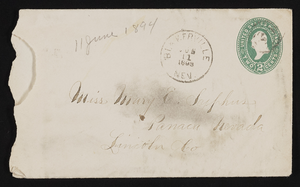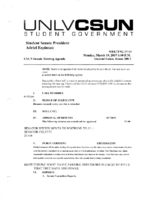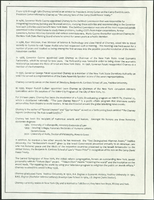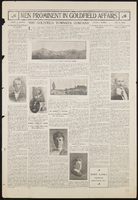Search the Special Collections and Archives Portal
Search Results

Interview with Philip Wymer Allen, July 9, 2004
Date
Archival Collection
Description
Text

Transcript of interview with Hazel Du Barton by Anne D. Barton, November 13, 1979
Date
Archival Collection
Description
On November 13, 1979, Anne Du Barton interviewed her mother, Hazel F. Du Barton (born Hazel F. Wingebach on July 13th, 1926 in Floral Park, New York) in their home in Las Vegas, Nevada. Mrs. Du Barton relocated to Las Vegas in 1955. This interview covers Las Vegas history, including local politics, nuclear testing, and the Helldorado Parade. Occupations Mrs. Du Barton has held include dress designer, dressmaker, clerical worker, bookkeeper, and hotel manager. She recalls her first experience camping at Mount Charleston and she was also an arts and crafts camp instructor for Campfire Girls, who used the campsite at Lee Canyon.
Text

Letter from E. E. Bennett (Los Angeles) to William Reinhardt, December 4, 1951
Date
Archival Collection
Description
Detailed discussion of the UP divesting itself of water production facilities to the Las Vegas Land and Water Company. Written in red pencil at the top of the page: "4705-11-22" and "80-Gen."
Text

Letter and envelope from John M. Bunker, Bunkerville, Nevada to Mary Etta Syphus, Panaca, Nevada
Date
Archival Collection
Description
From the Syphus-Bunker Papers (MS-00169). The folder contains an original handwritten letter, an envelope, a typed transcription of the same letter, and a copy of original letter attached.
Text

Ellen Lempe interview, March 23, 1977: transcript
Date
Archival Collection
Description
On March 23, 1977, Paul Pearson interviewed Ellen Lempe (b. 1928 in Detroit, Michigan). Lempe details her life in Sturgis, Michigan—her marriage, her kids and an automobile accident that resulted in gangrene and amputation—before moving to Las Vegas, Nevada. She recounts working as a telephone operator, gambling after work and a big win playing keno. Moreover, she describes her disinterest for politics, her husband’s love for sports and his work as a car salesman. The two end by discussing inflation and the changing attitude and landscape of the city.
Text

Meeting minutes for Consolidated Student Senate, University of Nevada, Las Vegas, March 19, 2007
Date
Archival Collection
Description
Text

Meeting minutes for Consolidated Student Senate, University of Nevada, Las Vegas, November 7, 1978
Date
Archival Collection
Description
Text

Ashok Mirchandani oral history interview: transcript
Date
Archival Collection
Description
Oral history interview with Ashok Mirchandani conducted by Kristel Peralta, Cecilia Winchell, and Stefani Evans on March 11, 2021 for the Reflections: The Las Vegas Asian American and Pacific Islander Oral History Project. In this interview, Mirchandani discusses his early life in Kolkata, West Bengal, India and arriving to Las Vegas, Nevada in 2002. He talks about Indian traditions he celebrates and Indian festivals in the United States. Mirchandani recalls his employment with the State of Nevada, becoming the Director of the Department of Business and Industry, and advocating for small businesses. Later, Mirchandani describes the importance of minorities in politics, engaging in policy making, and the need for Asian Americans in public services. Lastly, Mirchandani discusses the model minority myth, developing the Nevada Home Retention Program, and emphasizes children's mental health.
Text


